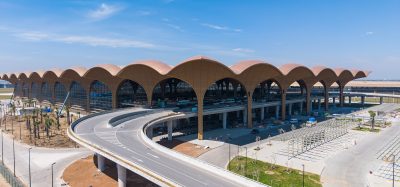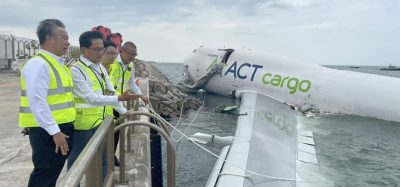A unique security training programme
Posted: 16 September 2005 | Ernst Schlecht, Head of Security and Safety Planning, Unique Zurich | No comments yet
Although often the overlooked aspects of security operations, there is an increasing need to include effective training and communications as an integral part of operating a safe and secure airport, writes Ernst Schlecht.
Although often the overlooked aspects of security operations, there is an increasing need to include effective training and communications as an integral part of operating a safe and secure airport, writes Ernst Schlecht.
The inspirational atmosphere of the aviation industry has been clouded increasingly by the latent threat of terrorist attacks. The increased security standards mean that airport and airline staff have to be trained to react appropriately. At Zurich Airport, a new interactive security training platform is due to be implemented in September. It complements various other innovative training and communication measures at Zurich Airport.
Card requirements
As of September 2005, anyone wishing to obtain a Zurich Airport Identification Card will have to complete a compulsory ‘Airport Security’ training module. This security regulation was issued by the European Parliament in September 2002 as a reaction to the events of September 11th.
Join us live: Shaping the Next Generation of Hold Baggage and Air Cargo Screening
Join us live for an insightful webinar on 11th December at 14:00 GMT, in collaboration with Smiths Detection, as we explore the strategic balance of operational efficiency, regulatory compliance, and sustainability in high-volume security environments.
This session offers a focused look into future-proofing your security strategy.
Key learning points
- Cost Reduction: Strategies to minimize bag travel time while simultaneously reducing operational costs.
- Regulatory Roadmap: Insights into the next wave of regulatory changes and their impact on future investment decisions.
- Sustainable Systems: Practical approaches to building sustainability into security systems and lowering the total cost of ownership (TCO).
- Scalable Solutions: Real-world examples of scalable systems supporting current airport growth and preparing for tomorrow.
Register now for expert insights, case studies, and actionable strategies on operational efficiency!
Zurich will be one of the first airports in Europe to implement the new regulation. Even though Switzerland is not an EU member, it is bound to the new regulation because of bilateral agreements. The EU prescribes a basic security awareness course for all airport and air carrier ground staff with access to security-restricted areas. In order to make the training as customer-friendly as possible, Unique (Flughafen Zürich AG) has helped to create a multi-lingual e-learning platform in cooperation with STI Security Training International GmbH. Staff can complete the course at any time and from any computer with an internet connection within 90 days after badge issuance. The system is geared towards Zurich Airport and is provided in four different languages.
A difficult task
Raising the security awareness of over 20 000 employees in a complex shift operation system like an airport is a challenge. How do you find a common basis for all the varying educational backgrounds, computer knowledge and language/reading skills, for example. The project vision was therefore to create a time-saving and cost efficient training system, which would fulfil the following requirements:
- Raise the security awareness of all employees with access to the non-public zone of the airport.
- Find a system that can be used during shift operation.
- Fulfil all international and national security regulations.
- Use an efficient and methodologically sound teaching system.
- Training completion within 90 days after badge issuance (automatic suspension and simultaneous re-activation after course completion)
- Measure the success of the project through statistic traceability
After a detailed analysis, a project team, consisting of Unique, the airport handling agents, the customs authorities and the police, decided to opt for an e-learning solution combined with classroom training for staff lacking basic computing or language/reading skills. The advantages of distance learning are evident; with the help of an e-learning platform it is possible to reach the bigger part of staff within a short time frame and to guarantee a maximum of efficiency through real-time updates.
According to industry studies, CBT or web-based training can bring up to 75 per cent of cost reduction in comparison to traditional classroom training. E-learning solutions adjust to the individual learning pace of the student. By combining e-learning and instructor-led classroom training, the number of successful tests can be further increased. Moreover, administrative work can be reduced to a minimum through the use of an efficient learning management system integrated into the e-learning platform.
Testing
A series of pilot user tests before the official introduction of the training brought very positive results. The primary user group included various educational backgrounds and occupational groups spanning from blue collar to white collar employees. The feedback was unanimously positive; the handling of the system was rated as simple and straightforward even by people who had never used a computer before. The content was also regarded as easily comprehensible and entertaining thanks to the various dialogues, exercises and interactive elements.
A comprehensive communication campaign informing the airport’s firms and partners of the new system and processes by means of letters, articles, staff walk-ins and special introductory courses for HR managers finished the project before its definitive implementation. The Swiss Federal Office of Civil Aviation (FOCA) approved Zurich Airport’s interactive security training in June this year.
To make use of synergies, there is also an interactive theory course for driving on the apron or the airside movement areas on the same training platform. It has been in operation since April 2005 and the successful completion of the course enables staff to obtain a driving permit.
Comprehensive communication strategy
Almost all of the core processes at the airport are directly or indirectly influenced by security. A holistic security concept is therefore a central factor for the long-term success and positive image of an airport. Only an integrated and well-balanced system of measures can provide optimal protection. However, high security equals high costs. A well-founded stakeholder management and communication strategy is essential to make staff and management aware of issues which are often forgotten in the hustle and bustle of daily business.
Despite the central role that security plays in international civil aviation, it is generally charged with a negative image internally. This is why Zurich Airport has its own safety and security communication specialist, who has developed a communication strategy to counteract this image and to propagate a culture of having an advisory role. It includes the following success factors:
- Clear and efficient internal communication enables us to make airport staff more aware of safety and security issues and to involve them in the process of implementing new security measures.
- Effective external marketing and PR-activities enable our potential customers to know about our consulting services.
- A well-structured and balanced training concept facilitates the roundup of the various training programmes.
- Cross-media communication is a key success factor in all our communication activities.
To achieve these goals, communication measures and awareness campaigns are conducted for airport staff as well as visitors. This includes awareness videos, expositions, regular articles in external media and company magazines, intranet and internet information, staff-walk ins and various interactive training tools.
Evacuation training
One of these training tools is an interactive CD-ROM which instructs staff on Zurich airport’s evacuation procedures. From each airport company there is a designated evacuation officer, trained through Unique’s own safety specialists. In buildings with large crowds of people it is of utmost importance that an evacuation can be carried out quickly and smoothly. Most airport visitors are not familiar with the facilities and rely on the competent leadership of the airport employees in case of an emergency. The CD-ROM, combined with traditional classroom training, serves as a tool to familiarise evacuation officers with their role in an entertaining way.
To conclude, comprehensive training and communication measures are often forgotten by safety and security managers who just have too much on their plate to think of the ‘soft factors’. However, the success of Zurich Airport’s communication and training measures has proven just how important these factors can be.
Ernst Schlecht
Ernst Schlecht is Head of Security and Safety Planning at Zurich Airport. He joined the company in 1976 after an engineering career in the manufacturing industry and in a consulting company. International mandates include: Chairman of the ACI Europe Security Committee and ACI representative for the European Civil Aviation Conference (ECAC).
The International Airport Summit is open for registration!
Date: 19 – 20 November 2025
Location: JW Marriott Hotel Berlin
At our flagship event of the year, we will dive into the future of airport operations, with expert-led sessions on passenger experience, innovative smart technologies, baggage handling, airside operations, data, security, and sustainability.
This is where global airport leaders come together to share insights, challenges, and real-world solutions.
Limited complimentary passes are available for eligible professionals – first come, first served!


















